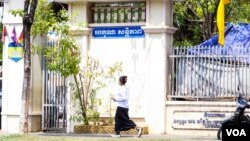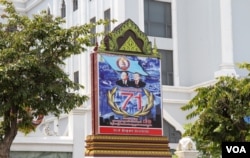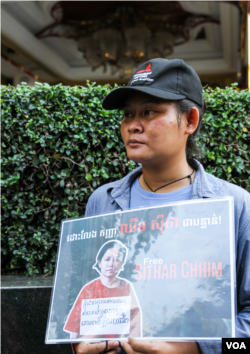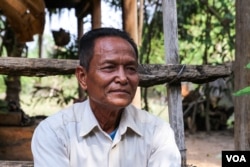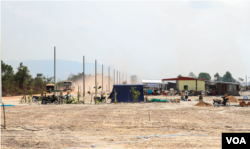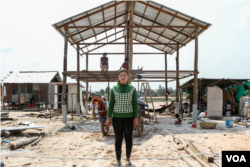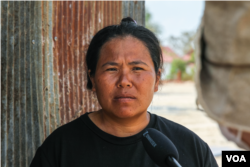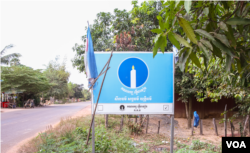PHNOM PENH/SIEM REAP — Everywhere you look in Cambodia’s capital are signs of the top two leaders of the Cambodian People’s Party (CPP) with the slogan “Thank You, Peace.” The same signs show up on highways and street corners across the country. It’s a message that floods the Facebook page of Prime Minister Hun Sen, one of the longest-ruling leaders in the world.
“Peace provides opportunity for people to live in a prosperous society. When there is peace, there is everything – all lives flourish, politically, economically, socially, and culturally, with peace,” said Sok Eysan, a ruling party senator and spokesman.
Yet this prosperity and opportunity is not accessible to many in Cambodia, and this year’s election — despite the kneecapping of Hun Sen’s opposition — will offer some insight into how thankful Cambodian voters are for the ruling party’s version of “peace.”
Hun Sen boasts of ending war and bringing economic stability to the country, but his government also has a well-recorded track record of violating human rights, silencing dissent and shuttering independent media.
“We want a livable wage, as citizens of this country that is so proud of peace!” said Nam Sivonn, a former employee of the NagaWorld casino and resort in Phnom Penh, where unions accuse officials of complicity in union busting and cracking down on peaceful protests.
“So then allow your workers to have peace and provide them with a livable income.”
Nam Sivonn was among the 1,329 employees who were laid off in April 2021, a move the company argued was due to a loss of profit during the pandemic, while the workers called it brazen retaliation against demands for better benefits from the union led by Chhim Sithor, who remains jailed and awaiting trial on criminal charges.
Chan Sreyrath, who has also joined the NagaWorld protests that began in December 2021, asked why the prime minister — often referred to by his honorific “Samdech” — had not demanded peace for workers at the casino not far from his Phnom Penh residence.
“Every issue circulating on social media, Samdech knows and gets involved. Why doesn’t Samdech take any actions when it comes to our problem? Don’t you really know? Or you just pretend you don’t know?” she asked.
Come July, Nam Sivonn and more than 9 million eligible voters in Cambodia will have their opportunity to convey their dismay or approval when the country holds its seventh national election, on July 23, 2023 — 30 years since the first post-war election in 1993.
“We are all going to vote. We are not afraid to choose anyone who has the willingness to find a solution to our problem. We’ll vote for you, regardless of our political tendency,” said Nam Sivonn.
Unionized workers — particularly in Cambodia’s garment sector — were a key voting block to the opposition Cambodia National Rescue Party’s (CNRP) success in 2013, when it narrowly lost to the ruling CPP.
The ruling party has aggressively pursued a two-pronged strategy in the decade since — closing down the space for opposition and dissent, while increasing engagement with young Cambodians who make up an ever-growing share of the electorate.
The CNRP has been banned, and in its place are a handful of small opposition parties with familiar faces, but without their leaders, Sam Rainsy and Kem Sokha, who are in exile and under house arrest, respectively.
In June last year, after five years of absolute control at the commune level, prime minister Hun Sen’s CPP was challenged by the Candlelight Party, an offshoot of the CNRP, which won about 22% of the popular votes and 2,176 commune council seats after campaigning on issues of social injustice, corruption, and abuse of power.
While the Candlelight Party is not expected to pose a serious challenge to the CPP this year — if it’s allowed to compete at all — its vote share could offer an indication of whether it is gaining traction or losing momentum. And a few seats in the National Assembly could provide a national platform the opposition currently lacks.
Ou Virak, founder of the Future Forum think tank, said he sees the Candlelight Party as a “temporary vehicle” for the opposition that’s likely to disappoint its supporters in the upcoming election. “They can’t pull it off. Then they’re going to lose momentum,” he said.
However, he also said that the ruling party’s formula for “peace” at all costs created its own complications.
“The question is actually when you are trying to force peace at all costs, even without justice, even facing injustice that people must accept it — I think it is going to be problematic,” he said.
Chek Roch should appreciate more than many the relative peace in Cambodia under Hun Sen’s nearly 40-year reign, as a former soldier fighting against the Khmer Rouge guerrillas.
But he says the ruling party has mostly fought to protect the “the rich and powerful,” and last year Chek Roch was elected as a member of Run Ta Ek commune council from the Candlelight Party in Siem Reap province.
“Villagers would tell me they regretted [voting for the CPP], when they risk losing their land or home,” Chek Roch told VOA Khmer last month. “They then switched their alliance and voted for me from [the opposition party]. They are not afraid, when they have nothing else to lose.”
Chek Roch’s commune is currently undergoing a newly launched satellite city development plan, known as Ron Ta Ek Development Village, where schools, hospitals, marketplaces, and other services are still under construction on a mostly empty land.
It was a move, in part, to make way for several hundred families evicted from their home in areas deemed as protected areas by the country’s Apsara National Authority, whose jurisdiction is to protect, preserve and manage Cambodia’s Angkor Archaeological Park.
Chan Sron, 41, a mother of three young children, was among those who lost their home in Kok Ta Chan near the Angkor Wat temple. She now faces a mountain of debt in this new and mostly empty community, located about 30 km from downtown Siem Reap, with bulldozers and dump trucks all around.
“It’s boiling hot here. There is no marketplace for me to make a living. Everyone here, including my family, are very poor,” Chan Sron told VOA Khmer. “My kids have been coughing and having fever. They are sick. There is so much dirt here. I think it is going to take years for public facilities here to become accessible to us.”
Ke Yatt, 32, another new resident of the planned community, was more optimistic, because the move allowed her family to attain land ownership without a penny.
“It is a big deal for my family to own land, because we are poor. This will create opportunities for us to do businesses, even though it takes time,” she told VOA Khmer.
While elections over the past decade have exposed deep discontent with the ruling party, there’s no debating that the general quality of life has improved for many Cambodians under Hun Sen.
Since the 1990s, with an open-market economy and billions in international aid, Cambodia’s GDP per capita has gone from about $300 per year to more than $1,600 last year, according to the World Bank. More students are learning to read, attending high school and going to university. And less people are dying from diseases like HIV/AIDS, tuberculosis and malaria.
Sinh Houng, 53, a child survivor of the Khmer Rouge genocide, embraces the ruling party’s message of peace, because it has paved the way for her to rebuild her life after the war. The Kampong Cham native has been making a living off selling yams and other tropical fruit in Phnom Penh for the past 17 years.
“[Cambodia] is not too developed, but also not too poor. His [Hun Sen’s] leadership is good enough,” said Sinh Houng. For the past 30 years, she has never missed one national election to elect “a good leader.”
The CPP has shown its ability to transform the political landscape in the past five years, effectively becoming a one-party state. But that’s not sustainable, said Sebastian Strangio, author of “Hun Sen’s Cambodia,” and now the ruling party is trying to figure out how far it can turn the democratic spigot.
“I think the CPP probably is aware that there is discontent and that there needs to be some sort of safety valve,” he said. “I think that’s [why] they are allowing the Candlelight Party to take part in the knowledge that the opposition remains divided.”
Yet even as it opens that safety valve, the leadership of the opposition has faced a steady stream of legal charges.
In mid-January, Thach Setha, one of the party’s vice presidents, was arrested and detained over allegedly writing a bad check in 2019. Son Chhay, another vice president, was convicted of defaming the ruling CPP and the National Election Committee over claims of election fraud in June commune elections. And Kong Korm, the party’s advisor, said he felt pressured to cease his political activity after he was threatened with land confiscation over a row with the government.
As long as there is discontent in Cambodia, “there is always the possibility that a lot of people will come out and cast votes for the Candlelight Party and against the CPP, which could create problems,” said Strangio.
Yet with its limited ability to operate, the Candlelight Party will find it challenging to “maintain a cohesive campaign,” he added. “I think ultimately the CPP will only permit political opening to the extent that it does not undermine its own power.”




